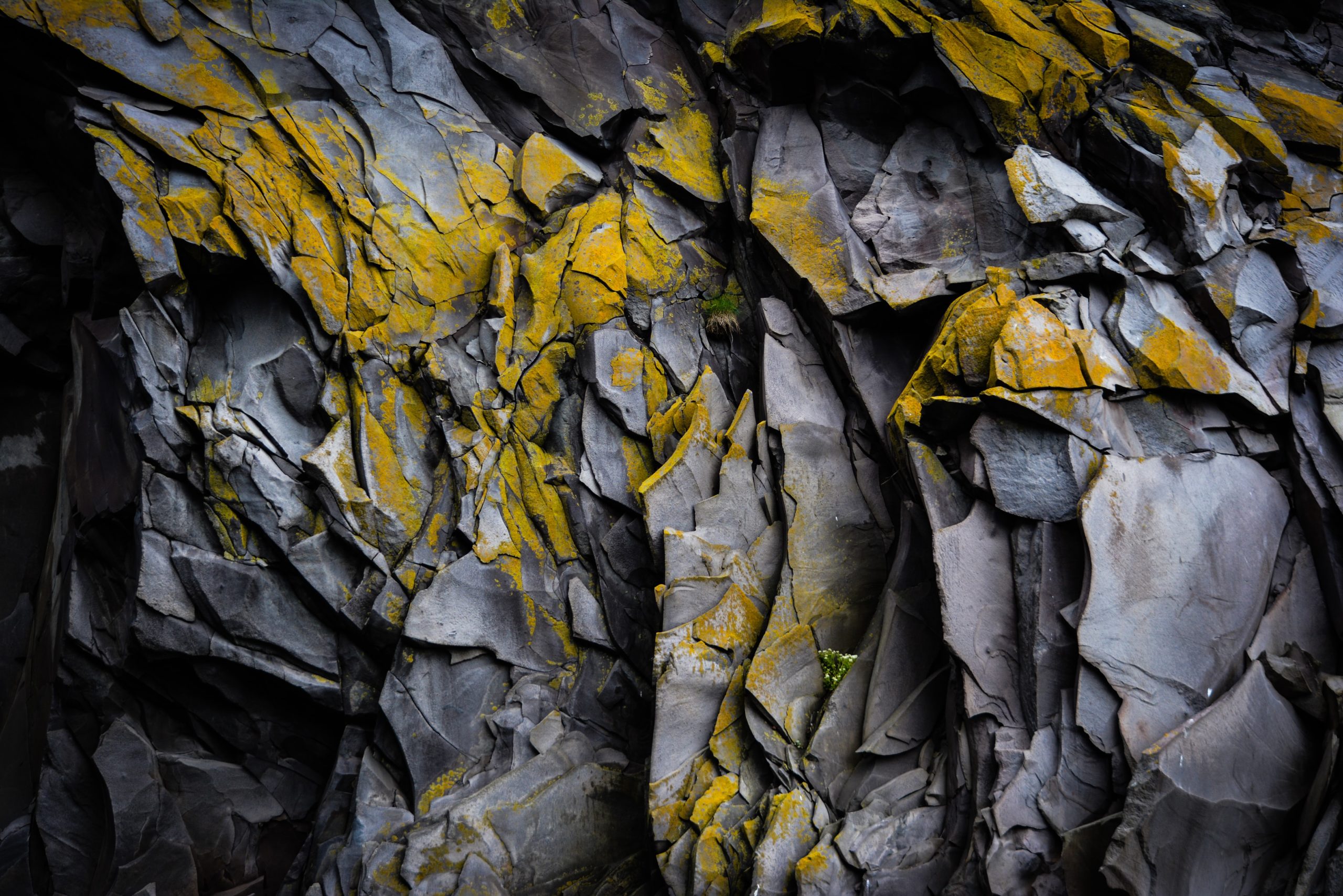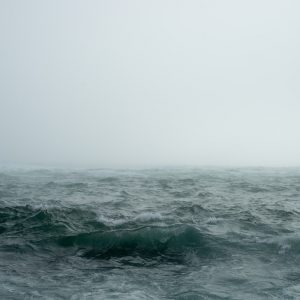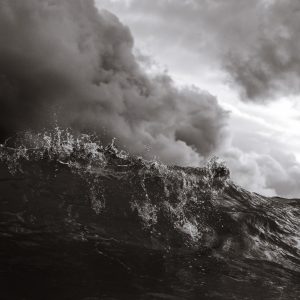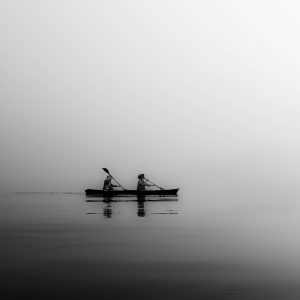Seven stars in the Empress’s crown.
Paul blinked, surprised by the clarity of the memory.
Alice had sung that single phrase to Paul one night as they sat on their haunches at the back of the yard, stoned and gazing up at the black shape of the hill in the middle distance. Her voice was flat, and the words didn’t fit the tune, but she repeated it until she got bored with the sound of herself. Alice had started calling the hill The Empress sometime over the summer. No one else Paul knew called it anything but the hill.
It didn’t really need a name. Everyone knew what it was.
Paul pushed down thoughts of Alice and her song, forcing his attention to the present, even as he gazed across the empty fields to where the hill still loomed. It was autumn, and unnervingly hot, with no motion to stir the heavy air as the afternoon wound down. Stan handed him a beer, then settled into his green plastic lawn chair. Paul looked around slowly, taking in the once-familiar neighborhood. The changes he saw superimposed themselves on his clear memory.
The six houses on the cul-de-sac were all split levels, put up in the late sixties. Their yards backed to scrubby wasteland that had endured through numerous waves of development, the terrain too rough to bother with. Paul had grown up on the cul-de-sac, and played back there in the fields when he was a kid. He had moved away after college, and his parents had sold the house and moved south.
Between the two houses on the right of the street’s curve a thin path ran back through the fields and into the cover of sparse, scattered trees.
“We wore that trail in the grass going back there as kids,” Paul said.
Stan sipped his beer. Unlike Paul, he had not moved away. He still lived in his parents’ old place, the first house on the right. That house at least hadn’t changed. It showed its age in its faded siding and white brick. “I remember. I still see kids using it now and then. Teen-agers.”
“Do they still go all the way out to the hill?”
Stan nodded. “I would think they do.”
As if on cue, three kids, two girls and a boy, trailed out of the scrub and grass to cut across the corner of the lawn, following the old path. They kept their heads down. They walked in single file, in step with each other. They paid no attention to Stan and Paul as they passed by. Paul could see the dust stuck to their skin and to their jeans, see how their hair was matted with it. Moths, disturbed by their passage, fluttered up from the grass.
Paul turned his head to watch them as they made their way out to the street.
“They can’t be more than thirteen, fourteen,” he said. “They go like they know what they’re doing.”
Stan half-smiled, not showing any teeth. “Of course they do. Don’t you remember how much we knew when we were their age?”
Paul laughed, and wiped the cool, sweating beer can across his forehead before he opened it. “This heat,” he said.
“It’s filthy,” Stan said. “I’ve been seeing birds just lying dead on the ground like they couldn’t take it and fell while they flew. Sparrows, mostly. Too small to handle the heat.”
Paul sipped his beer. “It doesn’t feel like it’s been twenty-six years,” he said. “Feels like we’re still just waiting for our ride to a concert.”
Stan shook his head, looking out toward the hill again. It had turned bluish in the changing light.
“So, what really brought you back?” Stan finally asked.
Paul exhaled. The air was like midsummer, thickly humid, but the night would come down soon. The October days were too short for such heat.
“The divorce was…harder than I thought it would be. After Cynthia left, I just really wanted to come home,” he said. “It was time.”
“That’s tough,” Stan said. “Look, do you want to stay for dinner? I was going to make spaghetti.”
“Raincheck. I have to unpack some stuff so I can function. The apartment is a lot smaller than I thought it would be.”
“Okay, then,” Stan said. “You know where to find me.”
#
It was a few days before Paul drifted back to visit Stan. He picked up a couple of sandwiches after work and brought them over for a cold dinner. The sky was already shifting from gold to blue as he pulled into Stan’s driveway.
Stan still had his plastic chairs facing the fields. The holes worn in the lawn showed how long they’d been there.
“Look around,” Stan said, mid-thought, as Paul came around the house. “We’re in a hollow, as wide as it is. Three or four miles wide. Probably a crater of some sort. Meteorite strike. The hill is at its center.”
“Okay,” Paul said, proffering the bag. “Are you hungry? There’s ham and cheese or turkey.”
“Do you have any idea how old that hill is?” Stan said, flicking the bright butt of his cigarette into the darkening sky to punctuate his question.
“Old,” Paul said.
Stan glanced sideways at him. “It’s younger than you think, even though it’s eroded, with the rock all worn away at the top and shoulders. In daylight, you can see how the rock is twisted and folded, too, and how the folds are worn down. That rock is sedimentary, I think. Easier to wear away. But you can also see the dark rock that pushed into it. That’s not from around here. I don’t know how it got here. Moving through the earth, somehow. Or falling out of the sky.” Stan tapped another cigarette from his dwindling pack.
“But what’s really worth noticing is how that hill stands alone. Look around. Nothing like it until the mountain ring starts up, what, eight or ten miles away?” He gestured south, where the mountains did indeed stand against the sky.
“That’s not how mountains should form,” Stan said. “Not with outliers like this hill.”
“It’s lonely.” He put the cigarette back and took the bag of sandwiches from Paul.
“Let’s go inside. I gave up and put the air back on.”
Stan was quiet while they ate, and Paul let his small talk drift into silence. But as they finished, Stan again began speaking from the middle of his own thoughts.
“And it’s weird, but I don’t think the kids know why they want to come up here. I know I didn’t, not in a way I could understand enough to explain. But it seemed…appropriate, somehow. Not right, but…right.”
Paul balled up the waxed paper wrappings and stuffed them into the bag.
“Do you ever go up there, anymore?” he asked.
“No. Not for years. Of course, I still feel the urge. But I can’t just go running through other people’s back yards anymore.”
#
The heat would not let go. Every time Paul returned to the cul-de-sac, the heat and the landscape dragged him back to that summer with Alice. He had enough to mourn without adding her.
Tonight he brought burgers to go with the beer. He and Stan had established their pattern, and were well on their way to a rut. The divorce had been chaos. A familiar pattern was what he needed now.
“I always thought I missed my father,” Stan said without preamble. That was his familiar pattern. He drew on his cigarette, blew the smoke up to the darkening sky. “I didn’t realize until later that it was the idea of him I missed. Shit, I was sixteen when he died. I didn’t even know him.”
He threw the butt of the cigarette out onto the lawn. It glowed there like a red firefly.
“I miss my mom, though,” Stan added.
Paul kept his eyes on the dark hill crouched behind the trees, already black against the deepening blue sky. “Yeah, well,” he said, and stopped. His parents were alive. He had no frame of reference. He didn’t want to sound stupid with some empty comment.
“It was after my dad died that I really felt the pull of the hill. I guess the idea of community, of communion, with the other kids who went up filled in the empty space where my family used to be.” Stan paused, flicked his lighter a couple of times, sparks without flame.
“You would think that there would still be a family, even with one part missing. But there wasn’t. My mother wasn’t strong enough to hold us together. She didn’t understand my sister at all, and Ellen took off as soon as she graduated.”
“And you know what happened with me.”
“Yeah, well,” Paul said again. Those had been ugly years, and he had moved away before Stan outgrew them. In the dark, he saw Stan turn his head toward him. It had grown too dark to read his expression.
“That hill calls to kids because kids don’t know how to fill the holes in their lives. They don’t know how to live with parts missing. Not enough experience. What’s up there, it offers them something.”
Paul realized how tight his grip had become on the smooth plastic arms of his chair.
“You’re starting to sound a little like me, now,” Paul said.
Stan snorted. “Sorry.”
They sat in silence for a while, watching the stars come out.
#
Another part of the pattern was the daily pilgrimage. The kids came trooping down as the sun sank, heading home to dinner. As usual, they ignored Stan and Paul as they trespassed.
But Paul swiveled to watch them until they reached the sidewalk and dispersed into the hot golden light. He rose and looked back up the trail.
“Stan,” he said. “The girl didn’t come down.”
“You’re right,” Stan said, keeping his eyes on the fields.
Paul took a step toward the path. Stan sighed, and stood, and stretched. “Let me get my walking stick.”
The dusty trail snaked back past the clipped edges of the yards and through the brush that filled the low, wide basin. The ground sloped down subtly, not enough to make the walk difficult but enough to hide them from the houses’ view. Even though they had only traveled a few hundred feet, the sense of isolation was heavy.
“We don’t have a lot of time tonight,” Stan said.
“I know,” Paul said. “But we have to at least see.”
The trail brought them to the edge of a pond that filled a carved-out oval hollow. Scrub willows grew around it, shaggy and split by lightning. Rocks the size of melons had been placed around the pond in an uneven border. Cans and jars were set into nooks in the rocks and into the crooks of the trees. They were full of water, dusted with a murky film of yellow pollen.
“I don’t remember this,” he said.
“Nor I,” said Stan. “But we’ve been gone a long time. Rituals change.”
The path continued through the sparse grass on the other side of the pond, winding around evenly spaced piles of rocks. Shadows filled the wide hollow, the air turning lavender around them although the sky above still held its brightness. The hill was a stronger presence here, in the quiet. Its shoulders seemed to shrug up, to bear the weight of the stars above them. There was a sense of dry awareness in the mass of rock as if it listened without caring to what noises the chattering humans made to it. As if it chose to ignore them.
“I just want to see what they’ve done with the rocks, and then we go,” Paul said. “I don’t like it here.”
Stan nodded. “Do you feel the pull of it?”
Paul shook his head. Their voices seemed too loud, here. As if their own noises covered the sounds of something else.
They followed the path a few yards further, into the midst of the rock piles. Between the rocks the ground was scraped clear of vegetation, down to its brown dust. A long shape stretched on the bare space near the center.
“Oh,” Stan said softly, caught off guard. He had recognized it.
A girl lay on the ground as if she had been dropped from the sky, blanketed in dust, no part of her skin or clothing clean. Moths clung in her hair like bits of paper confetti. Like lost souls, Paul thought as he knelt by her in the gathering dusk. There are so many.
He reached out to turn her over, then thought better of it. He watched, but did not see her breathing. He stood up. Stan came closer to prod at the girl’s hip with his walking stick, and screamed when she crumbled like ash under the slight pressure. The moths scattered.
“She’s not real,” Paul said, frightened wonder in his voice. “She’s a sand sculpture. How did they make her? How did they do it?”
Stan took Paul’s arm and steered him away. A dry wind picked up, kicking up the dust behind them. Paul let himself be led. But after a few steps he turned, sure that he saw someone following. A plume of dust rose in the air like a dancer in veils. A human shape hung like a ghost inside. The wind swept it closer.
“Stan,” he said, pulling Stan around to look.
Stan swung his stick through the cloud, dispersing it.
“We have to go. Now,” he said, and broke into an awkward run.
Paul ran with him through the failing light, to the safety of pavement and suburbia.
#
Paul stayed home the next night, restless, his nerves over-sensitive. The strange, still night was again too warm for this late in autumn. The earlier nightfall made him too aware of the discordance. Sounds of life going on in the other apartments only emphasized the disarray in his.
The building quieted as the night wore down. He went to bed but sleep escaped him. Alice filled its place, with her sing-song refrain of the seven stars in the Empress’s crown. The rhythm of her song merged with the stuttering rhythm of what else she had whispered to him that summer. What her father did to her when she was small. How she worried about her sister. When Paul closed his eyes, Alice looked like the girl made of dust. What was he supposed to have done? He turned the ceiling fan to the highest setting, and wrestled with the sweaty sheets. Coming home had been no answer.
Near dawn, the wind rose to a gale, and a storm crashed through with a pressure like the threat of a tornado in its wake. Branches crashed in the garden behind the building. Rain fell with the weight of stones on the roof. Paul welcomed the new rhythm that drove out the old. Alice’s voice couldn’t sing over this.
The downpour ended with daybreak, but left the sky a hazy, dim yellow and the air reloaded with humidity. Paul finally slept when the sun rose, its autumn angle filling his room with gold.
When he woke the shadows were creeping in. After the shadows would come the stars, he thought. Seven stars in the Empress’s crown.
#
The next time Paul went to the cul-de-sac, Stan had moved his chairs up to the patio, away from the verge. Stan stood when Paul came around the side of the house.
“How are you?” he said, meaning it.
“I have to go up,” Paul said. “It’s in my head. I have to see what’s up there and put it to rest.”
Stan shook his head. “Okay,” he said. “Okay. But I’m not going with you.”
Paul smiled, but it was a mask. “I don’t expect you to.”
Stan shrugged. “It’s late to start.” He sat down again in his familiar vigil. “I’ll be here when you come back down.”
Paul nodded and crossed the lawn, passed over the border into the wild scrub. Dust floated up around his feet as he went. Moths scattered. He felt the pull of it, harder now that he was alone, out of sight of the houses. Long shadows stretched out from the thin trees and clumps of grass.
He reached the pool with its rusted votive offerings. The water rippled under a breeze, but it was not enough to clear the caul of dust that covered it. He kept his distance as he passed it, and picked up the path again on its other side.
The area described by the piled rocks was empty now, just a circle of dust. Paul walked into it, tentative, and stopped at what he judged was the center. He turned until he faced the hill. From where he stood in the pattern, it looked as if the high knob of stone wore a crown of stars, dim against the fading sky. He did not count them. He knew their number.
He pushed on. It wasn’t far to the hill, now. The path widened as it angled gradually upward. Paul’s breath came more quickly, and he realized he was climbing the hill’s skirts. Dusk filled in the hollow below him. He climbed toward what was left of the light.
The wind picked up as the sun fell. It was still too warm. It seemed even warmer on the hill. The light was deep amber, slipping fast toward blue. Paul figured it was near six, now, and would be full dark in less than half an hour. He stopped climbing to let the wind dry the sweat on his face.
He leaned against an outcropping, looked over the sloped shoulder of the hill as it bent away before him. He was higher than he expected, almost at the summit. The bowl of earth stretched away, limited at last by a ring of electric light. As he rested, he looked around, thinking of how Stan had described it, matching it to what he saw.
Where the native rock had weathered away it revealed the deep folds and curves where it had bent under steady downward pressure. Intrusions of dark, alien rock nestled into the hilltop among the folds like eyes in sockets, warping the rock below it. Even under dust, it was glossy, threaded with deep red and green veins and occasional streaks of dull yellow. When Paul brushed it clean, it gleamed opalescent. But the feel of it was uncomfortable under his palm, warm, almost like flesh, and still as ungiving as stone. He took his hand away and stood free of it. He glanced up at the sky. It was time to go back.
As he turned a different sheen caught his eye. There, in the rock, he could make out the arch of an eye socket, the curve of a skull. Dull minerals traced the line of mandible. Paul bent and looked further, brushing away loose soil to find the scroll of a collarbone, broken but still in place. He stood, wiped his face with dusty hands, looked again from his new angle. In the heavy, fading light the shapes could be intrusions of quartz into the older black rock. They had to be. The rock could not have absorbed bones whole.
He looked around him, and saw that where the rocks were scrubbed clean by wind there were many more suggestively skeletal shapes trapped like flies in amber. Was one of them Alice, he thought, caught in final devotion to her Empress? He could picture her as she had been at sixteen, kneeling in some ritual, her brown hair tangled against her neck, grey eyes lifted up to count the stars as the black stone crept its way over her legs and hips and upraised arms until the hill had swallowed her whole and her bones floated in the dark matrix.
“Seven stars,” he said, without thinking, following the old cadence of her song. It was the comfort of old memory, of youth and unquestioned faith. He repeated it. And again.
And she answered.
She twisted in the black rock with a sound like the grinding of sand on stone, eroding her way free. Basalt had filled the hollows where rich marrow had been, cracking the bones with its weight. Still, she pulled her broken spine upright, balanced her stony skull upon it with ponderous care. She turned her barren face to him, and the stars ranged behind her in a circlet.
He screamed as mindlessly as he had sung out. In a panic he fell and rolled down the long slope of the hill, out of the last warmth of dying sunset and into deep shadow. He got his feet under him and stumbled through the dark empty brush for the white pinpricks of manmade light.
#
Stan met him in the middle distance between his yard and the waste land, walking out into the long grass. In the darkness Paul recognized him by the flare of his cigarette above the sharp glare of his flashlight. Stan threw the light over Paul’s face, blinding him and forcing him to stop.
“You okay?” Stan said.
Paul rasped out an ugly laugh. “Not really.”
Stan exhaled. Smoke twisted in the beam of light he held. Paul waited, catching his breath. The warm, strange air was no refreshment.
“You know,” Paul started. His voice dropped away. His shoulders sagged. Stan took a step toward him, but Paul waved him off.
“You know,” he started again, “you were right about missing the idea of someone. Of not really knowing them but wishing you did.”
Paul started walking slowly toward the back yards, as if he were ancient. Stan kept pace with him.
“Do you remember Alice?” Paul said.
Stan stopped. “Alice. Murphy. Yeah. Her family moved away before senior year.”
Paul caught up to Stan.
“She isn’t what I remembered.”
Stan stared at him, swinging the light back up into Paul’s face. Paul squinted and looked away, back toward the distant hill.
“We’re too old for this,” Stan said at last, pointing the flashlight down so Paul could see again. “We’ve forgotten too much. Come on,” he said, turning away with the light and leaving Paul standing with the huge darkness behind him, hoping he would follow.




